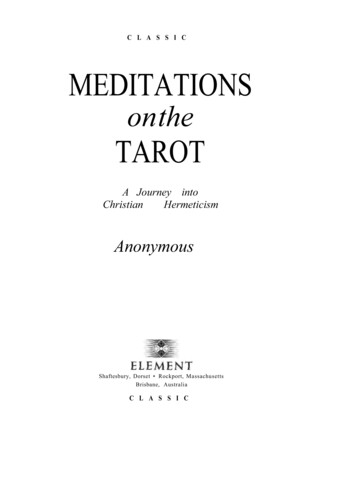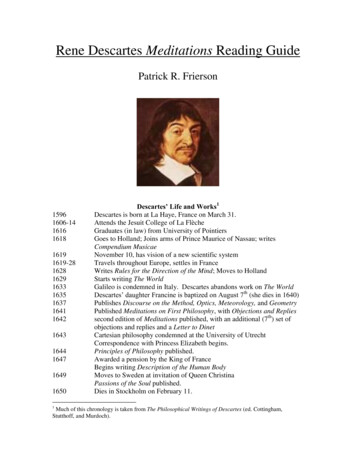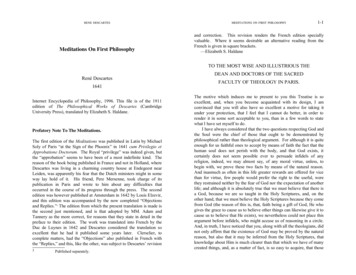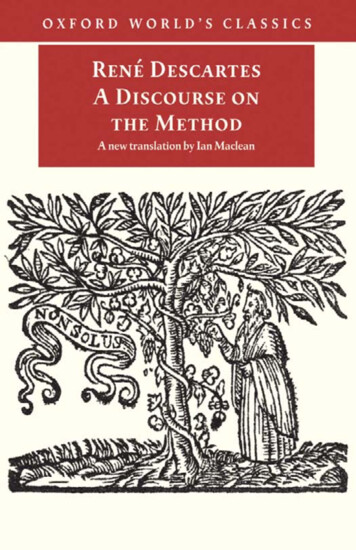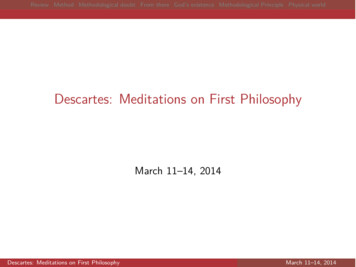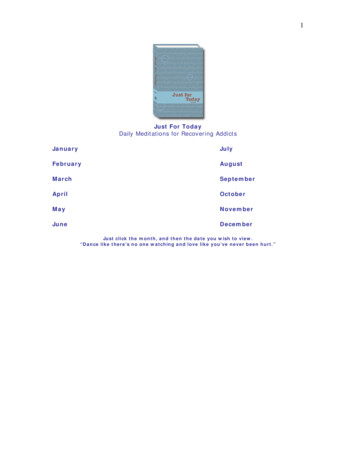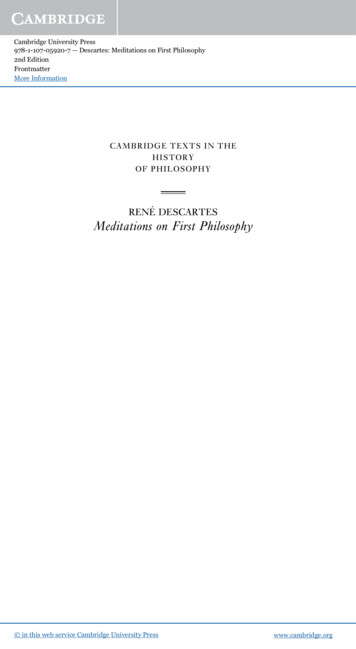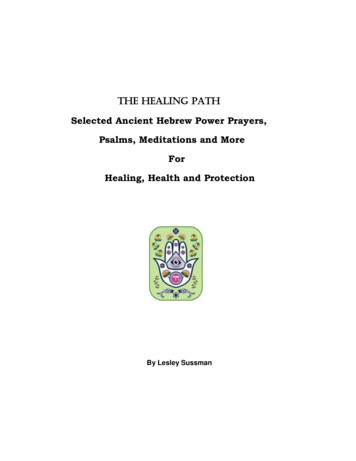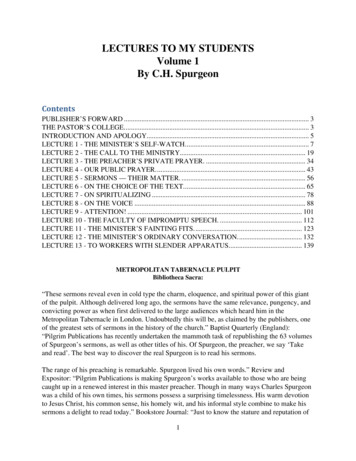
Transcription
Marcus AureliusMeditationsA New Translation, with an Introduction, by Gregory HaysTHE MODERN LIBRARYNEW YORK
ContentsTitle PageChronologyHalf Title PageIntroduction by Gregory HaysMeditationsBook 1: Debts and LessonsBook 2: On the River Gran, Among the QuadiBook 3: In CarnuntumBook 4Book 5Book 6Book 7Book 8Book 9Book 10Book 11Book 12
NotesIndex of PersonsAbout the TranslatorThe Modern Library Editorial BoardCopyright
Meditations
IntroductionGregory HaysMarcus Aurelius AntoninusStates will never be happy until rulers become philosophers or philosophers becomerulers.—PLATO, The RepublicMarcus Aurelius is said to have been fond of quoting Plato’sdictum, and those who have written about him have rarelybeen able to resist applying it to Marcus himself. Andindeed, if we seek Plato’s philosopher-king in the flesh wecould hardly do better than Marcus, the ruler of the RomanEmpire for almost two decades and author of the immortalMeditations. Yet the title is one that Marcus himself wouldsurely have rejected. He never thought of himself as aphilosopher. He would have claimed to be, at best, a diligentstudent and a very imperfect practitioner of a philosophydeveloped by others. As for the imperial throne, that camealmost by accident. When Marcus Annius Verus was born, inA.D. 121, bystanders might have predicted a distinguishedcareer in the Senate or the imperial administration. They
could hardly have guessed that he was destined for theimperial purple, or seen in their mind’s eye the lonely bronzehorseman whose upraised hand greets us from the Capitolinehill in Rome across two thousand years.Marcus sprang from a distinguished enough family. Theyear of his birth coincided with his grandfather’s secondtenure of the consulship, in theory Rome’s highest office,though now of largely ceremonial importance. And it was tobe his grandfather who brought him up, for his father diedwhen he was very young. Marcus makes reference in theMeditations to his father’s character as he remembered it orheard of it from others, but his knowledge must have beenmore from stories than from actual memories. Of theremainder of his childhood and his early adolescence weknow little more than can be gleaned from the Meditations.The biography of him in the so-called Historia Augusta (acurious and unreliable work of the late fourth centuryprobably based on a lost series of lives by the third-centurybiographer Marius Maximus) tells us that he was a seriouschild, but also that he loved boxing, wrestling, running andfalconry, that he was a good ballplayer and that he loved tohunt. None of these are surprising occupations in an upperclass youth.Book 1 of the Meditations offers glimpses of Marcus’sschooling, and we can fill out the picture by what is knownof upper-class education generally at this period. His first
instructors, like the unnamed teacher mentioned inMeditations 1.5, were probably slaves, from whom hewould have mastered the rudiments of reading and writing.At a later stage he would have been handed over to privatetutors to be introduced to literature, especially, no doubt,Vergil’s great epic, the Aeneid. But literature served only asa preparation for the real goal. This was rhetoric, the key toan active political career under the empire, as it had beenunder the Republic. Under the supervision of a trained rhetor,Marcus would have begun with short exercises beforeprogressing to full-scale practice declamations in which hewould have been asked to defend one side or another inimaginary law cases, or to advise a prominent historicalfigure at a turning point in his career. (Should Caesar crossthe Rubicon? Should Alexander turn back at the Indus? Whyor why not?)Such training was conducted in Greek as well as Latin.Since at least the beginning of the first century B.C. theRoman upper classes had been essentially bilingual, andMarcus’s spoken and written Greek would have been asfluent as the French of a nineteenth-century Russian aristocrator the Chinese of a Heian Japanese courtier. Marcus wouldhave read Homer’s Iliad and Odyssey and the tragedies ofEuripides side by side with the Aeneid, and studied thespeeches of the great Athenian orator Demosthenes asintensively as those of the Roman statesman Cicero. It wasGreek writers and artists who constituted the intellectual
elite at the capital; when in later life the emperor conversedwith his court physician, Galen, he would have done so in thelatter’s native tongue. Above all, Greek remainedoverwhelmingly the language of philosophy. In the lateRepublic and early empire, writers like Lucretius, Ciceroand Seneca had worked to create a philosophical literature inLatin, with notable success. But the great thinkers—Plato,Aristotle, Theophrastus, Zeno, Chrysippus, Epicurus, etc.—had all been Greeks. Serious philosophical investigationrequired a familiarity with the language they wrote in and theterminology they developed. That Marcus composed his ownMeditations in Greek is natural enough.In 137, when Marcus was sixteen, a crucial event tookplace. The reigning emperor, Hadrian, was childless. Anillness had brought him near to death a year previously, andit was clear that he would not live forever. Hadrian owed histhrone to his adoption by his predecessor and distantrelative, Trajan. Following Trajan’s example, Hadrian haddesignated the distinguished aristocrat Lucius CeioniusCommodus to succeed him. In 137, however, Ceionius diedunexpectedly, and Hadrian was forced to cast about for anew successor. His choice fell on the childless senatorAntoninus, whom he selected with the proviso that Antoninusshould in turn adopt Marcus (his nephew by marriage) alongwith Ceionius’s son Lucius Verus, then aged seven. Marcustook on the family name of his adopted father, becomingMarcus Aurelius Antoninus.
Hadrian’s death the following year left Marcus first in linefor the throne. His education and that of the younger Veruswere now matters of still greater concern, and it is clear thatno expense was spared. For training in Greek rhetoric, hewas entrusted to Herodes Atticus, a fabulously wealthyAthenian rhetorician whose tempestuous relations with hisfamily, fellow citizens and the imperial court itself wouldhave furnished ample material for a soap opera. Hisinstructor in Latin oratory was Marcus Cornelius Fronto, aprominent rhetorician from Cirta in North Africa. By anaccident of fate, many of Fronto’s letters to Marcus havesurvived, and they illustrate the close relationship betweenstudent and teacher. They also suggest Fronto’s regret atseeing Marcus move away from rhetoric to delve ever moredeeply into philosophy. The first book of the Meditationspays tribute to a number of philosophers from whom Marcuslearned, both formally and informally, and he is likely tohave studied with or listened to many others.Marcus would have learned much outside the classroom aswell. For training in legal and political matters, an informalapprenticeship bound aristocratic youths to older publicfigures—men like Junius Rusticus, whose influence Marcuschronicles in 1.7. But the single greatest influence was surelyMarcus’s adopted father, Antoninus Pius. Marcus wouldhave watched as Antoninus received embassies, tried legalcases and dictated letters to his deputies. MeanwhileMarcus’s own position as heir apparent was signaled in
various ways. In 140 he served as consul (at the age ofnineteen), and would serve again in 145. In the same year hemarried Antoninus’s daughter Faustina, to whom he paystribute in Meditations 1.17.Edward Gibbon’s History of the Decline and Fall of theRoman Empire describes the reign of Antoninus as“furnishing very few materials for history, which is indeedlittle more than the register of the crimes, follies, andmisfortunes of mankind.” It furnishes equally little materialfor Marcus’s biography. In the decade and a half between145 and 161 we learn little of Marcus’s occupations, and ouronly glimpses of his inner development come from hiscorrespondence with Fronto. But the two poles that wouldgovern the remainder of his life—the court and philosophy—seem by this point to be fully established. There is noevidence that Marcus experienced anything like the“conversion” to philosophy that some ancient figuresexperienced (or affected), but it is clear that by the middle tolate 140s philosophy was becoming increasingly central tohis life.On August 31, 161, Antoninus died, leaving Marcus as hissole successor. Marcus immediately acted to carry out whatappears to have been Hadrian’s original intention (perhapsignored by Antoninus) by pushing through the appointment ofhis adopted brother, Lucius Verus, as co-regent. Verus’scharacter has suffered by comparison with Marcus’s. Ancient
sources, in particular the gossipy Historia Augusta, tend topaint him as a self-indulgent degenerate—almost anotherNero. This may be unfair; it is certainly not the picture of himwe get from Marcus’s own reminiscences in theMeditations. It does seem clear, however, that Marcusfunctioned as the senior emperor in fact if not name. It wouldbe surprising if he had not. He was almost a decade older,and had been trained for the position by Antoninus himself.What kind of ruler did this philosopher-king prove to be?Not, perhaps, as different from his predecessors as one mighthave expected. Though an emperor was all-powerful intheory, his ability to control policy was in reality much morelimited. Much of his time was spent fielding problems thathad moved up the administrative ladder: receiving embassiesfrom the large cities of the empire, trying appeals of criminalcases, answering queries from provincial governors anddealing with petitions from individuals. Even with afunctional system of imperial couriers, news could takeweeks to travel from the periphery of the empire to thecenter; imperial edicts took time to move down the chain ofcommand. While the emperor’s decision had the force oflaw, enforcement was almost entirely in the hands ofprovincial governors, whose diligence might be affected byincompetence, corruption, or an understandable desire not toantagonize local elites.We get occasional glimpses of Marcus’s day-to-day duties
from the evidence of imperial decisions preserved in letters,inscriptions and the legal codes. Surviving legislation showsa certain interest in the freeing of slaves and in regulationsrelating to the guardianship of orphans. Attempts have beenmade to tie the first to Marcus’s philosophical convictionsand the second to his own memories of life without a father.But it remains unclear how much of the policy is due toMarcus himself, and how far it differs from that of Marcus’spredecessor, Antoninus. Perhaps more interesting are thetraces of Marcus’s personality to be discerned in thephrasing of imperial documents, where we find a scrupulousattention to detail and a self-consciousness about linguisticusage that seems to differentiate Marcus from hispredecessors. Neither trait surprises in the author of theMeditations or a student of Fronto, whose extant lettersplace great stress on the quest for the mot juste.One of Marcus’s priorities was to preserve good relationswith the Senate. The goal was to disguise the absolutenesswith which the emperor ruled: to preserve a facade—andsometimes, no doubt, even to achieve the reality—ofconsensus and cooperation. A hundred years before,aristocrats might have dreamed of a restored Republic (assome certainly did). But by the second century it was clearthat there was no alternative to the principate. The Senateexpected deference in public and hoped for influence behindthe scenes; “good” emperors were willing to play along. Incultivating the upper classes Marcus was following in the
footsteps of Antoninus and Trajan, rather than of Hadrian,whose relations with the Senate had been prickly. And it isthis, as much as anything else, that is responsible for hisreputation as a benevolent statesman. An emperor might doas he liked while he lived, but it was the senatorial historians—men like Cornelius Tacitus in the 120s or Cassius Dio inthe generation after Marcus’s death—who had the last word.Another area where Marcus’s policy continued that of hispredecessors related to a small and eccentric sect known asthe Christians. In the course of the next century they wouldbecome an increasing problem for the imperialadministration, and they were prominent enough in Marcus’sday to attract an extended denunciation from a certain Celsus,part of whose work “Against the Christians” still survives.The sect met with contempt from those intellectuals whodeigned to take notice of it (Marcus’s tutor Fronto wasevidently one), and with suspicion and hostility fromordinary citizens and administrators. The Christians’disfavor stemmed from their failure to acknowledge the godsworshipped by the community around them. Their“atheism”—their refusal to accept any god but their own—endangered their neighbors as well as themselves, and theirreluctance to acknowledge the divine status of the emperorthreatened the social order and the well-being of the state.Christianity had been illegal since the early second centurywhen a query from Pliny the Younger (then governor of
Bithynia in Asia Minor) prompted the emperor Trajan toestablish a formal policy: While Christians were not to besought out, those who confessed to the faith were to beexecuted. But empire-wide persecution did not become areality until a much later date. The main threat to Christiansin the second century came from individual provincialgovernors, acting either on their own initiative or underpressure from local communities. In the late 170s, forexample, civic unrest at Lyons resulted in a virtual pogrom ofGreek-speaking Christians resident there. Marcus’s mentorJunius Rusticus had tried and executed Christians (theapologist Justin Martyr among them) in his capacity as cityprefect. Marcus himself was no doubt aware of Christianity,but there is no reason to think that it bulked large in his mind.The one direct reference to it in the Meditations (11.3) isalmost certainly a later interpolation, and the implicitreferences some scholars have discerned are surely illusory.Marcus, in any case, had more serious concerns than thistroublesome cult. Soon after his accession, relations betweenRome and its only rival, the Parthian empire in the East, tooka dramatic turn for the worse. Since at least the time ofTrajan the two states had been locked in a cold war thatwould continue for the next two centuries, and that once ageneration or so flared up into a military conflict. The deathof Antoninus and the accession of two new and untried rulersmay have tempted the Parthian ruler Vologaeses III to test thewaters. In 162 his forces occupied Armenia and wiped out a
Roman garrison that had gone to the rescue. Syria itself wasthreatened. Rome had no choice but to respond.It was Verus, the younger emperor, who was sent east,where he remained for the next four years. Neither he norMarcus had any military experience to speak of (Antoninus’speaceful reign had given little scope for it), and the day-today conduct of the war was no doubt left to the professionals.After initial setbacks the Romans rallied and, under suchcommanders as the dynamic young Avidius Cassius, forcedthe Parthians to sue for peace. Parthia would remain a threat,but one that could be dealt with by diplomatic means for theimmediate future.Verus and his senior colleague had no time to bask in theirtriumph, however. Within a year the empire was in the gripof a devastating plague, apparently brought back from theEast by Lucius’s troops. Its effects may not have been quiteas apocalyptic as later writers suggest, but the death toll wascertainly high, and it also delayed the emperors’ response toa second threat. This was the increasing instability on theempire’s other border, the northern frontier that separatedRome from the barbarian peoples of Germany, easternEurope and Scandinavia. During this period a number ofthese tribes were under pressure from peoples farther northand reacted by moving across the empire’s borders—not forconquest, but in search of land to settle. Rome’s reactionalternated between aggressive resistance and attempts at
accommodation; its failure to develop a workable policywould eventually result in the collapse of the Western empiresome three centuries later.In some places a line could be drawn. Hadrian’s greatwall, stretching across Britain, was intended to secure theempire’s most distant frontier; under Antoninus it had beenbriefly superseded by a second line farther to the north. Butsuch fortifications were impracticable on the continent, and itwas there that the threat was concentrated. Rome stillremembered the catastrophe of A.D. 9, when the Romangeneral Varus and three legions had marched into the forestsof Germany, never to return. In the second century, thegreatest source of anxiety was the area farther south, roughlycorresponding to modern-day Romania and Hungary.Trajan’s conquest of Dacia two generations before hadcleared out a possible source of trouble, but the potential forfriction remained. In Marcus’s day three peoples presented aspecial problem: the Quadi, the Marcomanni, and theJazyges, also called Sarmatians. The removal of threelegions to Parthia had seriously weakened the Romanposition on the northern frontier, and barbarians tookadvantage of the situation. In 168, Marcus and Verusmarched north to deal with them.Much of the remainder of the reign would be spent onintermittent warfare, first in the so-called MarcomannicWars of the early 170s and then in a second campaign later in
that decade. And most of the burden was to be borne byMarcus alone, for Verus died suddenly (apparently of astroke) in early 169. It was a very different kind of war thanthe traditional campaign Verus’s armies had waged. Theconventional military and diplomatic tactics that workedagainst the Parthians were of limited use here. Instead, theRomans had to negotiate with individual chieftains whoseauthority was limited and whose reliability was always indoubt. When negotiation failed, the only alternative was aslow and bloody succession of small-scale engagementsrather than pitched battles. The progress of the campaign isrecorded on the column erected in Rome to commemorate theclose of the Marcomannic Wars. In spite of its triumphalpurpose, the engraved scenes that spiral around themonument paint a grim picture of brutal fighting, devastationand execution. “Spiders are proud of catching flies,” Marcusnotes mordantly, “men of catching hares, fish in a net, boars,bears, Sarmatians” (10.10). The gruesome vignette that opensMeditations 8.34 (“a severed hand or foot, or a decapitatedhead”) may well reflect Marcus’s own experience.By 175 the Romans seemed to have gained the upper hand.But at this point disturbing news arrived. Avidius Cassius,who had distinguished himself as a general during theParthian War and who as governor of Syria now served asvirtual regent of the Eastern empire, had revolted anddeclared himself emperor. Some of the Eastern provinces(notably Cappadocia) remained loyal to Marcus, but Cassius
was recognized as emperor throughout much of the East, andin particular in Egypt, whose grain supply was crucial to thecapital. Civil war seemed inevitable, and was preventedonly by Cassius’s assassination at the hands of a subordinate.Marcus was nevertheless obliged to travel east to reasserthis authority, taking with him Faustina (who died in thecourse of the journey). He visited the major cities of the East,Antioch and Alexandria, arriving finally at Athens, where hewas initiated into the Eleusinian Mysteries, a set of mysticrites connected with the worship of Demeter, the goddess ofagriculture.Now in his fifties, Marcus was in declining health, and therevolt of Cassius had only underlined the need to makearrangements for the succession. Faustina had borne at leastthirteen children, many of whom had died young. By the mid170s, Marcus had only one surviving son, Commodus, justentering his teens. There was no reason for Marcus tocontinue the policy of adoption followed by hispredecessors, and there is no reason to think he evenconsidered it. The years that follow see Commodus’s rapidpromotion to a position not far short of co-emperor. He wasconsul in 177 at the age of fifteen. In the same year he wasaccorded all the major imperial privileges, except for thepost of Pontifex Maximus, the head of the Roman statereligion, held by the reigning emperor alone, and for life.The gains of the Marcomannic Wars had not proved
permanent, and in 178, Marcus and Commodus marchednorth again. Two years later Marcus died at age fifty-eight,the first emperor to pass on the throne to his son sinceVespasian a century before. Sadly, Commodus’sperformance did not bear out whatever promise Marcus haddiscerned in him. He was to be remembered as a dissolutetyrant, a second Caligula or Nero whose many defects wereonly emphasized by the contrast with his father. Hisassassination after a twelve-year reign would usher in thefirst in a series of power struggles that would burden theempire for the next century.Philosophical BackgroundThe composition of the Meditations is normally dated to the170s—Marcus’s last decade. That this was a dark andstressful period for him can hardly be doubted. In the tenyears between 169 and 179 he had to cope with constantfighting on the frontier, the abortive revolt of Cassius, and thedeaths of his colleague Verus; his wife, Faustina; and others.Though he could hardly have anticipated the century ofturmoil that would follow his death, he may have suspectedthat his son and successor, Commodus, was not the man hehoped. That in these circumstances Marcus should havesought consolation in philosophy is only natural. Butunderstanding what Marcus looked for from hisphilosophical studies requires a certain amount of
orientation. To understand the Meditations in context, wemust familiarize ourselves not only with Stoicism, thephilosophical system that underlies the work, but also withthe role of philosophy in ancient life more generally.Today philosophy is an academic discipline, one that fewpeople other than professional philosophers would considercentral to their everyday existence. While we may think ofourselves as having a “philosophy of life,” it bears littlerelation to what goes on in the philosophy departments of ouruniversities. The careers of twentieth-century analyticphilosophy often seem remote from what the Americanphilosopher Thomas Nagel terms “mortal questions”: theproblems involved in making ethical choices, constructing ajust society, responding to suffering and loss, and coming toterms with the prospect of death. Indeed, most of us would beinclined to see these issues as the province of religion ratherthan philosophy.For Marcus and his contemporaries, the situation was verydifferent. Ancient philosophy certainly had its academic side.Athens and other large cities had publicly financed chairs ofphilosophy, and professional philosophers taught, argued andwrote, as they do today. But philosophy also had a morepractical dimension. It was not merely a subject to write orargue about, but one that was expected to provide a “designfor living”—a set of rules to live one’s life by. This was aneed not met by ancient religion, which privileged ritual over
doctrine and provided little in the way of moral and ethicalguidelines. Nor did anyone expect it to. That was whatphilosophy was for.Philosophy in the modern sense is largely the creation ofone man, the fifth-century B.C. Athenian thinker Socrates. Butit is primarily in the Hellenistic period that we see the rise ofphilosophical sects, promulgating coherent “belief systems”that an individual could accept as a whole and which weredesigned to explain the world in its totality. Of theseHellenistic systems the most important, both for Romans ingeneral and for Marcus in particular, was the Stoic school.The movement takes its name from the stoa (“porch” or“portico”) in downtown Athens where its founder, Zeno(332/3–262 B.C.), taught and lectured. Zeno’s doctrines werereformulated and developed by his successors, Cleanthes( 3 3 1 – 2 3 2 B.C.) and Chrysippus (280–c. 206 B.C.).Chrysippus in particular was a voluminous writer, and it washe who laid the foundations for systematic Stoicism. Thisearly “academic” Stoicism is the source of certain key termsand concepts that reappear frequently in the Meditations, andproper understanding of Marcus’s approach requires somefamiliarity with the system as a whole.StoicismOf the doctrines central to the Stoic worldview, perhaps themost important is the unwavering conviction that the world is
organized in a rational and coherent way. More specifically,it is controlled and directed by an all-pervading force thatthe Stoics designated by the term logos. The term (fromwhich English “logic” and the suffix “-logy” derive) has asemantic range so broad as to be almost untranslatable. At abasic level it designates rational, connected thought—whether envisioned as a characteristic (rationality, the abilityto reason) or as the product of that characteristic (anintelligible utterance or a connected discourse). Logosoperates both in individuals and in the universe as a whole.In individuals it is the faculty of reason. On a cosmic level itis the rational principle that governs the organization of theuniverse.1 In this sense it is synonymous with “nature,”“Providence,” or “God.” (When the author of John’s Gospeltells us that “the Word” —logos—was with God and is to beidentified with God, he is borrowing Stoic terminology.)All events are determined by the logos, and follow in anunbreakable chain of cause and effect. Stoicism is thus fromthe outset a deterministic system that appears to leave noroom for human free will or moral responsibility. In realitythe Stoics were reluctant to accept such an arrangement, andattempted to get around the difficulty by defining free will asa voluntary accommodation to what is in any case inevitable.According to this theory, man is like a dog tied to a movingwagon. If the dog refuses to run along with the wagon he willbe dragged by it, yet the choice remains his: to run or bedragged. In the same way, humans are responsible for their
choices and actions, even though these have been anticipatedby the logos and form part of its plan. Even actions whichappear to be—and indeed are—immoral or unjust advancethe overall design, which taken as a whole is harmonious andgood. They, too, are governed by the logos.But the logos is not simply an impersonal power thatgoverns and directs the world. It is also an actual substancethat pervades that world, not in a metaphorical sense but in aform as concrete as oxygen or carbon. In its physicalembodiment, the logos exists as pneuma, a substanceimagined by the earliest Stoics as pure fire, and byChrysippus as a mixture of fire and air. Pneuma is the power—the vital breath—that animates animals and humans. It is,in Dylan Thomas’s phrase, “the force that through the greenfuse drives the flower,” and is present even in lifelessmaterials like stone or metal as the energy that holds theobject together—the internal tension that makes a stone astone. All objects are thus a compound of lifeless substanceand vital force. When Marcus refers, as he does on a numberof occasions, to “cause and material” he means the twoelements of these compounds—inert substance and animatingpneuma—which are united so long as the object itself exists.When the object perishes, the pneuma that animated it isreabsorbed into the logos as a whole. This process ofdestruction and reintegration happens to individual objects atevery moment. It also happens on a larger scale to the entireuniverse, which at vast intervals is entirely consumed by fire
(a process known as ekpyrosis), and then regenerated.2If the world is indeed orderly, if the logos controls allthings, then the order it produces should be discernible in allaspects of it. That supposition not only led the Stoics tospeculate about the nature of the physical world but alsomotivated them to seek the rationality characteristic of thelogos in other areas, notably in formal logic and the natureand structure of language (their interest in etymology isreflected in several entries in the Meditations). Thissystematizing impulse reappears in many other fields as well.The catalogue of Chrysippus’s own works preserved by thelate-third-century biographer Diogenes Laertius is very longindeed; it includes not only philosophical treatises in anarrow sense, but also works such as “On How to ReadPoetry” and “Against the Touching Up of Paintings.” LaterStoics would try their hands at history and anthropology aswell as more conventionally philosophical topics.The expansion of Stoic thought was not only intellectualbut also geographical. The movement had been born inAthens. In the century and a half that followed Chrysippus’sdeath it spread to other centers, in particular to Rome. TheRomans of the second century B.C. were in the midst of acourse of conquest that by the end of the century would leavethem the effective masters of the Mediterranean. Withconquest came culture. Looking back on the rapidHellenization of the Roman aristocracy between 200 B.C. and
his own day, the poet Horace famously observed that“conquered Greece was the true conqueror.” Nowhere is theinfluence of Greece more obvious than in philosophy. Greekphilosophers, including the Stoics, Panaetius (c. 185–109B.C.), and Posidonius (c. 135–50 B.C.), visited Rome tolecture. Many spent extended periods there. In the firstcentury B.C. it became the fashion for young upper-classRomans to study in Athens, in an ancient version of theeighteenth-century Grand Tour. Roman aristocrats acted aspatrons to individual philosophers and asse
instructors, like the unnamed teacher mentioned in Meditations 1.5, were probably slaves, from whom he
